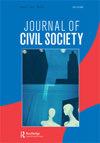The growth of civil society organizations in Mexico: a structural change analysis
IF 0.9
Q3 POLITICAL SCIENCE
引用次数: 0
Abstract
ABSTRACT Understanding how citizens’ organizations arise and endure is one of the most challenging topics in civil society research of emerging democracies. This article aims to explain the causes of the growing number of civil society organizations in Mexico throughout the country’s democratization process. Drawing upon an institutionalist perspective, this analysis tests the hypothesis that a transformation in the political opportunities structure changed citizens’ incentives to create formal organizations. We use a linear regression analysis, which treats the probable dates of the breaks in a time series (1950–2014) as unknown variables to be estimated. The identification of specific breaking points is a necessary input for the elaboration of an appropriate explanans, which in this argument is associated with a process of institutional change. Our goal is to contribute to the understanding of the conditions that explain the emergence of a civil society sector in new democracies.墨西哥民间社会组织的成长:结构变迁分析
摘要了解公民组织是如何产生和存续的,是新兴民主国家公民社会研究中最具挑战性的课题之一。本文旨在解释墨西哥民主化进程中民间社会组织数量不断增加的原因。从制度主义的角度来看,这项分析检验了一种假设,即政治机会结构的转变改变了公民创建正式组织的动机。我们使用线性回归分析,将时间序列中可能的中断日期(1950–2014)视为待估计的未知变量。确定具体的突破点是制定适当解释的必要投入,在本论点中,解释与制度变革过程有关。我们的目标是帮助理解新民主国家出现民间社会部门的原因。
本文章由计算机程序翻译,如有差异,请以英文原文为准。
求助全文
约1分钟内获得全文
求助全文

 求助内容:
求助内容: 应助结果提醒方式:
应助结果提醒方式:


